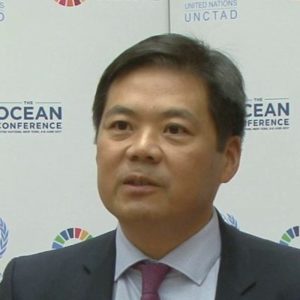Organization Intergovernmental Organizations
World Trade Organization | WTO

Green Economy | Trade and Environment
SDG1 | SDG2 | SDG3 | SDG5 | SDG8 | SDG9 | SDG10 | SDG14 | SDG17
The World Trade Organization (WTO) is the only global international organization dealing with the rules of trade between nations. WTO agreements are negotiated and signed by the bulk of the world’s trading nations and ratified in their parliaments. The goal is to ensure that trade flows as smoothly, predictably and freely as possible.
The WTO provides a forum for negotiating agreements aimed at reducing obstacles to international trade and ensuring a level playing field for all, thus contributing to economic growth and development. The WTO also provides a legal and institutional framework for the implementation and monitoring of these agreements, as well as for settling disputes arising from their interpretation and application. The current body of trade agreements comprising the WTO consists of 16 different multilateral agreements (to which all WTO members are parties) and two different plurilateral agreements (to which only some WTO members are parties).
Over the past 60 years, the WTO, which was established in 1995, and its predecessor organization the GATT have helped to create a strong and prosperous international trading system, thereby contributing to unprecedented global economic growth.
Sustainable development and protection and preservation of the environment are fundamental goals of the WTO. They are enshrined in the Marrakesh Agreement, which established the WTO, and complement the WTO’s objective to reduce trade barriers and eliminate discriminatory treatment in international trade relations.
The WTO contributes to protection and preservation of the environment through its objective of trade openness, through its rules and enforcement mechanism, through work in different WTO bodies, and through ongoing efforts under the Doha Development Agenda. The Doha Agenda includes specific negotiations on trade and environment and some tasks assigned to the regular Trade and Environment Committee.
The Trade and Environment Division
The Trade and Environment Division provides service and support to WTO committees dealing with trade and environment and technical barriers to trade. It supports the work of the Committee on Trade and Environment (CTE) by organizing and facilitating discussions; providing expertise, research and technical assistance to WTO members; reporting to senior management and WTO members on discussions in other intergovernmental organizations (IGOs), including negotiation and implementation of trade-related measures in multilateral environmental agreements. The division maintains contacts and dialogue with NGOs, the private sector, secretariats of multilateral environmental agreements and other international organizations on issues of mutual interest in the area of trade and environment. The Division undertakes research on issues under its purview and maintains the WTO Environmental Database.
The Trade and Environment Committee
The Trade and Environment Committee is the standing forum dedicated to dialogue between governments on the impact of trade policies on the environment, and of environment policies on trade. Created in 1995, the Committee has followed a comprehensive work programme and has been an incubator for ideas on how to move the discussion forward.
Experts

Aik Hoe Lim
Aik Hoe Lim is the Director of Trade and Environment Division at the World Trade Organization (WTO).
Jean-Marie Paugam
Jean-Marie Paugam is Deputy Director General of the World Trade Organization (WTO).Events

Body Meeting
WTO Public Forum 2024 | Re-globalization: Better Trade for a Better World
10 – 13 Sep 2024
WTO
WTO

Learning



